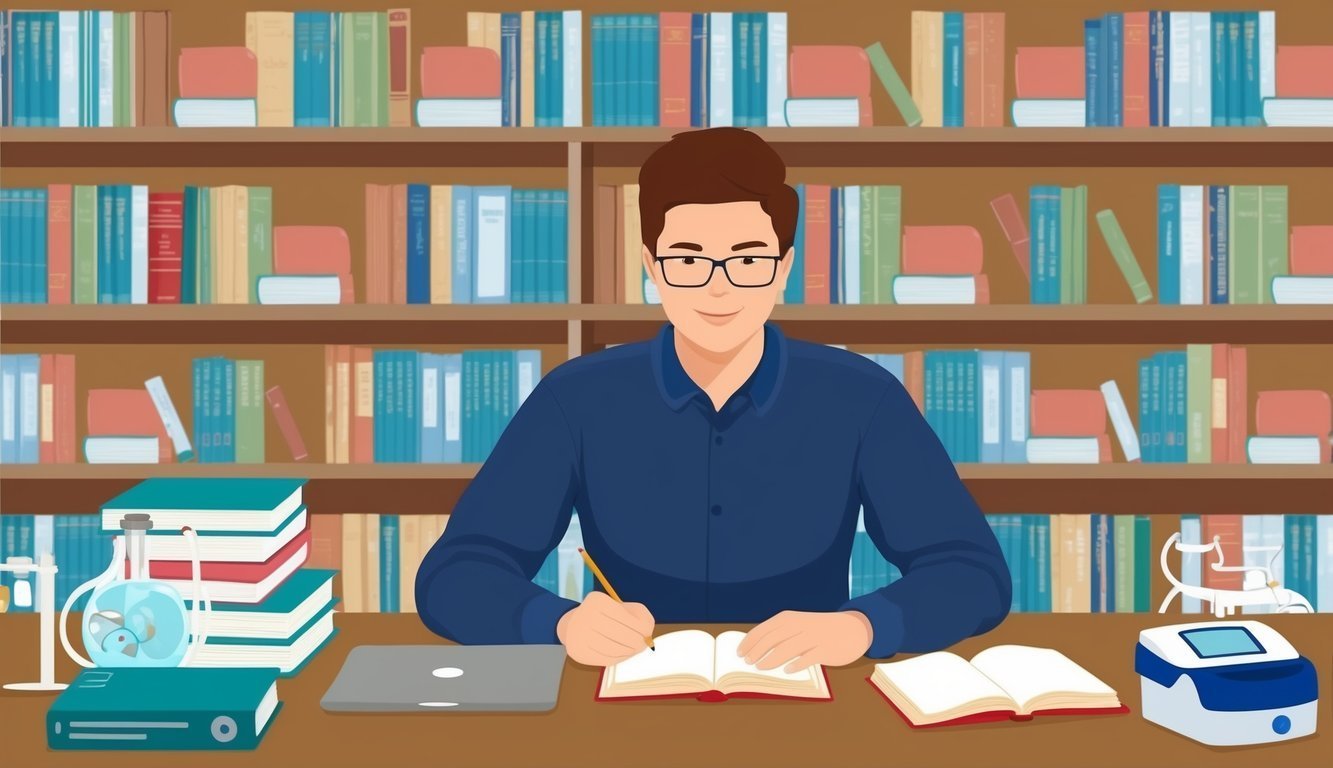Becoming a pharmacist is an excellent career choice if you are interested in healthcare and enjoy helping others. You typically need to complete a Doctor of Pharmacy (Pharm.D.) program after earning a relevant bachelor’s degree and passing a series of licensing exams. This path not only provides you with the skills necessary for the profession but also opens doors to various career opportunities within the healthcare industry.
Your journey will begin with foundational education, which usually includes coursework in chemistry, biology, and pharmacology.
Following this, you’ll enter a pharmacy school where you’ll gain comprehensive training in medication management and patient care.
There are several requirements and steps involved, such as completing internships and passing the North American Pharmacist Licensure Examination (NAPLEX).
For detailed guidance on these steps, consult reputable sources like Forbes’ guide on becoming a pharmacist and Nurse.org’s breakdown of requirements.
As you explore this rewarding career, consider the various specializations within pharmacy, which can enrich your professional experience.
Pharmacies today do more than dispense medication; they offer critical health services and education to patients.
This aspect of the profession emphasizes the vital role pharmacists play in improving community health.
Understanding the Role of a Pharmacist
Pharmacists play a vital role in healthcare, ensuring safe medication use and patient care.
Their responsibilities span various settings, and their expertise extends to different specializations within the field.
Scope of Practice
As a pharmacist, your scope of practice involves multiple responsibilities aimed at optimizing patient care.
You will:
-
Dispense Medications: Provide accurate prescriptions to patients while ensuring they understand usage and potential side effects.
-
Medication Therapy Management (MTM): Review patient medication regimens, identifying drug interactions, and optimizing therapeutic outcomes.
-
Patient Counseling: Educate patients on health conditions and medication adherence to enhance their understanding and compliance.
Pharmacists also collaborate with other healthcare professionals to develop comprehensive care plans, which improves the overall quality of patient management.
Pharmacy Settings
Pharmacists work in diverse settings, each presenting unique responsibilities and challenges.
The primary environments include:
| Pharmacy Setting | Description |
|---|---|
| Retail Pharmacies | Focus on dispensing prescriptions and providing over-the-counter medications. |
| Hospital Pharmacy | Manage inpatient care, ensure medication safety in hospitals, and work with medical staff. |
| Community Pharmacies | Offer personalized care and health consultations to local residents. |
| Clinical Pharmacists | Collaborate directly with healthcare teams to optimize patient drug therapies. |
| Consultant Pharmacists | Provide expert guidance on medication management in various healthcare facilities. |
Your role can vary significantly based on the setting, influencing how you interact with patients and the healthcare team.
Types of Pharmacists
Different types of pharmacists specialize in various aspects of care, each contributing distinctly to patient health.
Some examples include:
-
Retail Pharmacists: Primarily involved in dispensing medications and offering advice on health products.
-
Hospital Pharmacists: Focus on inpatient care, working closely with physicians to provide effective medication therapy.
-
Clinical Pharmacists: Engage in direct patient care, assessing medication efficacy and recommending adjustments based on patients’ needs.
-
Consultant Pharmacists: Usually operate on a contractual basis to review and optimize medication use in facilities and clinics.
Understanding these specializations will help you identify your career path and the skills needed for success in different pharmacy environments.
For detailed guidance on becoming a pharmacist, explore resources like NurseJournal for a comprehensive overview.
Education and Prerequisites
To become a pharmacist, you must navigate through specific educational requirements and prerequisites that will prepare you for the profession.
Educational pathways typically include obtaining a bachelor’s degree, completing a pre-pharmacy program, and ultimately earning a pharmacy degree such as a Doctor of Pharmacy (PharmD).
Bachelor’s Degree
Your journey begins with a bachelor’s degree, which often includes essential courses in biology, chemistry, math, and other sciences.
Many students choose to major in a related field such as biology or chemistry to build a solid foundation for their pharmacy education.
Transitioning to pharmacy school requires a minimum of two years of undergraduate coursework, but many opt for a full four-year degree to strengthen their qualifications.
A strong academic record will not only help with admission but also ensure you grasp critical concepts in anatomy and physiology, which are vital for understanding drug interactions and patient care.
Pre-Pharmacy Program
A pre-pharmacy program is vital for those intending to apply to pharmacy school.
This program typically involves specific coursework and prepares you for the Pharmacy College Admission Test (PCAT), which assesses your readiness for pharmacy studies.
During this phase, courses will include an in-depth study of pharmaceutical sciences and basic medical knowledge.
It’s important to maintain a strong GPA and obtain relevant experience, either through internships or volunteer work in healthcare settings.
This preparation will give you a competitive edge in the pharmacy college admissions process.
Pharmacy Degree Options
Once you’ve completed your undergraduate studies and pre-pharmacy requirements, the next step is to pursue a pharmacy degree.
Most pharmacists earn a Doctor of Pharmacy (PharmD), a professional degree that typically takes four years to complete.
PharmD programs include a curriculum that covers advanced topics like pharmacology, drug therapies, and the business aspects of pharmacy practice.
Clinical rotations are often part of the program, giving you hands-on experience in various pharmacy settings, such as hospitals and retail pharmacies.
After graduation, you’ll need to pass licensing exams to practice as a pharmacist.
Licensure and Certification
To practice as a pharmacist in the United States, you must obtain proper licensure and certification.
These processes involve passing specific exams, which validate your education and knowledge in pharmacy practice, as well as optional certifications that can enhance your professional credentials.
North American Pharmacist Licensure Exam
The North American Pharmacist Licensure Exam (NAPLEX) is a crucial step for anyone aspiring to become a pharmacist.
This examination assesses your competence in pharmacy practice, focusing on areas such as pharmacology, clinical knowledge, and patient safety.
Key points about NAPLEX:
- Eligibility: To take the NAPLEX, you must hold a Doctor of Pharmacy (Pharm.D.) degree from an accredited institution.
- Format: The exam consists of 225 multiple-choice questions, with a passing scaled score usually set around 75.
- Registration: You can register for the exam through the National Association of Boards of Pharmacy (NABP).
Completion of the NAPLEX is necessary for obtaining pharmacist licensure in most states.
Multistate Pharmacy Jurisprudence Exam
The Multistate Pharmacy Jurisprudence Exam (MPJE) evaluates your knowledge of pharmacy law, regulations, and ethical practices within the pharmacy profession.
Important aspects of MPJE include:
- State-Specific Content: The MPJE is tailored to the laws of the state where you plan to practice, ensuring you are well-versed in local regulations.
- Eligibility: You typically need to complete the NAPLEX before you can take the MPJE.
- Scoring: Like the NAPLEX, the passing score is a scaled score, often set at around 75.
You must successfully complete the MPJE to gain full licensure and ensure compliance with pharmaceutical regulations.
Specialty Certifications
While licensure is mandatory, specialty certifications can enhance your career prospects.
These certifications demonstrate advanced knowledge in specific areas of pharmacy practice.
Notable certifications include:
- Board of Pharmacy Specialties (BPS) certifications in areas such as pharmacotherapy, oncology, and pediatrics.
- Requirements: Most specialized certifications require a certain number of practice hours in the specialty area and successful completion of a specialized exam.
- Continuing Education: To maintain your specialty certification, you may need to complete continuing education requirements regularly.
Having specialty certifications can set you apart in the competitive job market and provide you with opportunities for growth in your pharmacy career.
Gaining Experience

Acquiring relevant experience is crucial for your development as a pharmacist.
Engaging in internships, residencies, and roles such as a pharmacy technician can enhance your skills and understanding of the profession.
Internships and Residencies
Internships are essential in providing hands-on experience while you pursue your Doctor of Pharmacy (Pharm.D.) degree.
These experiences typically take place in various settings, including retail pharmacies, hospital pharmacies, and clinical research environments.
You may find internships that focus on specific areas, such as:
| Type of Internship | Description |
|---|---|
| Retail Pharmacy | Works with prescriptions and patient care in community settings. |
| Hospital Pharmacy | Involves collaboration with healthcare teams and managing medication therapy. |
| Clinical Research | Participates in studies to advance pharmaceutical knowledge. |
Residencies, often a year-long commitment, provide in-depth training in clinical practice.
Completing a residency can open up more advanced career opportunities and enhance your clinical judgment.
Working as a Pharmacy Technician
Starting as a pharmacy technician is a practical way to gain experience in the pharmaceutical field.
This role allows you to work alongside pharmacists, gaining insight into daily operations and patient interactions.
Key responsibilities may include:
- Assisting with prescriptions: Preparing medications and labeling prescriptions for patients.
- Customer service: Communicating with patients about their medications and answering inquiries.
- Inventory management: Monitoring stock levels and ensuring the pharmacy is well-supplied.
You can often secure a pharmacy technician position while still in school.
This not only builds your resume but enhances your understanding of the pharmacy’s role in healthcare.
Consider pursuing certifications to improve your qualifications and job prospects in this area.
Career Advancement and Specialization
Pursuing a career as a pharmacist offers numerous opportunities for advancement and specialization.
By engaging in continuing education and exploring advanced practice options, you can enhance your skills and open new pathways in your pharmacy career.
Continuing Education
Continuing education is crucial for staying current with evolving practices and regulations in pharmacy.
Many states require pharmacists to complete a specific number of continuing education hours each year to maintain their licenses.
You can find various accredited programs that cover topics such as pharmacotherapy, patient care, and ethics in pharmacy.
Engaging in these programs not only fulfills licensing requirements but can also enhance your knowledge and skills.
Many pharmacists choose to further their education by obtaining certifications in specialized areas.
Such certifications can distinguish you from your peers and may lead to better job prospects and higher salaries.
Advanced Practice and Management
Advanced practice roles allow you to take on greater responsibilities within pharmacy operations.
Becoming a pharmacy manager or clinical pharmacist often requires additional training and certification.
Pharmacy managers oversee daily operations, guiding staff and ensuring compliance with regulations.
They possess strong leadership and organizational skills, which are vital in a fast-paced environment.
Further studies, such as obtaining a Doctor of Pharmacy (Pharm.D.) or a residency, can prepare you for these roles.
Management skills learned during this training enable you to improve workflows and enhance patient care.
Pharmacy Specialties
Specializing in a specific area of pharmacy can significantly broaden your career prospects.
Popular specialties include oncology, pediatrics, cardiology, and nuclear pharmacy.
Each specialty focuses on unique patient needs and treatment protocols.
Board certification can be pursued in these areas, demonstrating expertise that can lead to advanced clinical roles.
Each specialty has its own set of skills and knowledge requirements.
These often necessitate additional training and experience.
Specialized pharmacists often collaborate with healthcare teams, playing a critical role in patient care management.
This collaboration improves treatment outcomes and enhances your professional satisfaction.

